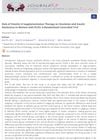 2 citations,
August 2021 in “Journal of Turkish sleep medicine”
2 citations,
August 2021 in “Journal of Turkish sleep medicine” People with polycystic ovary syndrome are more likely to have poor sleep, restless legs syndrome, anxiety, and depression.
 1 citations,
February 2016 in “Revista Brasileira de Ginecologia e Obstetrícia”
1 citations,
February 2016 in “Revista Brasileira de Ginecologia e Obstetrícia” High Lipid Accumulation Product levels are linked to more hirsutism in women with Polycystic Ovary Syndrome.
 1 citations,
November 2014 in “British journal of medicine and medical research”
1 citations,
November 2014 in “British journal of medicine and medical research” PCOS and related metabolic issues often run in families.
 1 citations,
May 2013 in “Journal of the Egyptian Women's Dermatologic Society (Print)”
1 citations,
May 2013 in “Journal of the Egyptian Women's Dermatologic Society (Print)” PSA could be a marker for hyperandrogenism in women, but more research is needed.
 February 2024 in “International journal of health, medicine and nursing practice”
February 2024 in “International journal of health, medicine and nursing practice” Raising awareness about PCOS can improve women's quality of life.
 January 2024 in “International journal of yogic, human movement and sports sciences”
January 2024 in “International journal of yogic, human movement and sports sciences” Yoga Nidra improves well-being and reduces anxiety in women with PCOS.
 September 2023 in “Research Square (Research Square)”
September 2023 in “Research Square (Research Square)” Evening primrose oil significantly improves hormone levels and reduces BMI and cholesterol in women with PCOS.
 February 2020 in “Research Square (Research Square)”
February 2020 in “Research Square (Research Square)” Women with PCOS have worse physical health but similar mental health compared to those without PCOS.
 April 2017 in “Journal of evolution of medical and dental sciences”
April 2017 in “Journal of evolution of medical and dental sciences” Most women with excess hair growth had Polycystic Ovary Syndrome, and severity wasn't linked to hormone levels.
 January 2015 in “Endocrine updates”
January 2015 in “Endocrine updates” Bariatric surgery patients need careful before and after surgery care for safety and long-term health.
 April 1999 in “Therapeutische Umschau”
April 1999 in “Therapeutische Umschau” Hair loss and excessive growth treated with various options, including new laser technology.
March 2024 in “LGU journal of life sciences” Poor diets worsen PCOS symptoms in young women.
 July 2021 in “International Journal of Homoeopathic Sciences”
July 2021 in “International Journal of Homoeopathic Sciences” Certain factors can trigger hormonal imbalances and cyst formation, leading to Polycystic Ovarian Syndrome (PCOS).
 March 2019 in “Evidence Based Women Health Journal (Online)”
March 2019 in “Evidence Based Women Health Journal (Online)” Vitamin D supplements increased ovulation rates in women with PCOS who were vitamin D deficient.
89 citations,
March 2001 in “Endocrine practice” The guidelines help doctors diagnose and treat hormone-related disorders in women.
 9 citations,
May 2021 in “Frontiers in Cell and Developmental Biology”
9 citations,
May 2021 in “Frontiers in Cell and Developmental Biology” DNA methylation changes in women with PCOS could be used as disease markers and suggest new treatment targets.
 4 citations,
August 2021 in “Clinical and Experimental Reproductive Medicine”
4 citations,
August 2021 in “Clinical and Experimental Reproductive Medicine” The 2018 guideline for PCOS suggests new diagnostic criteria and treatments, but recognizes the need for more research.
 September 2023 in “Cureus”
September 2023 in “Cureus” Dr. SKS Hair Booster Serum effectively treats hair loss in women with PCOS.
 January 2023 in “International journal of clinical medicine”
January 2023 in “International journal of clinical medicine” Women with PCOS and hair loss have lower levels of the protein gelsolin in their blood.
February 2024 in “IntechOpen eBooks” Proper nutrition can help manage PCOS symptoms and improve overall health.
 October 2023 in “IntechOpen eBooks”
October 2023 in “IntechOpen eBooks” Genes and epigenetic changes are important in the development of Polycystic Ovary Syndrome.
 77 citations,
March 2004 in “Human Reproduction”
77 citations,
March 2004 in “Human Reproduction” Women with irregular periods and/or excessive body hair are more likely to have polycystic ovaries, and this condition is linked to higher health risks.
 68 citations,
January 2022 in “International Journal of Molecular Sciences”
68 citations,
January 2022 in “International Journal of Molecular Sciences” PCOS management includes lifestyle changes and medications, with ongoing research into repurposed drugs for better treatment options.
 9 citations,
February 2022 in “Genes”
9 citations,
February 2022 in “Genes” Women with PCOS have more Bifidobacterium in their gut compared to those without PCOS.
 4 citations,
May 2024 in “The Lancet”
4 citations,
May 2024 in “The Lancet” Bariatric surgery improves ovulation rates in women with PCOS and obesity better than medical therapy.
 2 citations,
November 2022 in “Bioscience Reports”
2 citations,
November 2022 in “Bioscience Reports” Polycystic ovary syndrome and iron overload share similar symptoms and can be potentially treated with blood removal, diet changes, and probiotics.
 February 2022 in “Mediators of Inflammation”
February 2022 in “Mediators of Inflammation” Women with Polycystic Ovary Syndrome (PCOS) have lower levels of a substance called DIAPH1 in their blood, which is linked to changes in sugar metabolism and insulin resistance.
 991 citations,
January 2011 in “Nature Reviews Endocrinology”
991 citations,
January 2011 in “Nature Reviews Endocrinology” The document concludes that PCOS is a complex disorder caused by both genetic and environmental factors, affecting women's health in various ways, and requires personalized treatment.
 120 citations,
June 2008 in “American Journal of Epidemiology”
120 citations,
June 2008 in “American Journal of Epidemiology” A simple screening method found that 6.3% of women in a semiurban area in Sri Lanka have polycystic ovary syndrome, with most showing menstrual irregularities.
 50 citations,
February 2007 in “Clinical obstetrics and gynecology”
50 citations,
February 2007 in “Clinical obstetrics and gynecology” Early detection and treatment of PCOS in teenagers is important to manage symptoms and prevent severe issues.



























